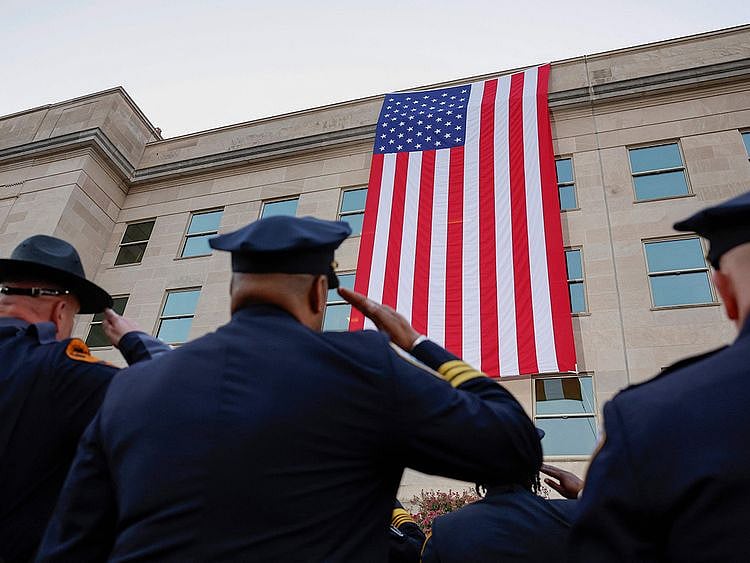America’s long war on terror and its impact
Richard Beck’s ‘Homeland’ explores deep cultural shifts and lasting consequences of 9/11

It’s a matter of course that a momentous event in the historical experience of a nation would be given an evocative name — one charged in the mind of citizens with full meaning and implication — that goes on in time to acquire permanent tenure in the collective consciousness.
In America, we think of names such as Pearl Harbor, the Selma March, the Kennedy Assassination, Vietnam, the Civil Rights Act and so on, but most importantly in our time we think of Nine Eleven, which stands in the mind of contemporary Americans less as a temporal designation and more as a storm of being in the country’s historical landscape.
According to the Pew Research Center, three quarters of Americans today continue to perceive that event as the most significant turning point in their lives, with that perception spanning virtually every traditional demographic divide, including Americans with college degrees and those without a high school diploma.
This week may be a good time to ask, in the cold light of hindsight, 23 years after the fact, how America had chosen to turn with that turning point on Sept. 11, 2001 and how it had allowed, as it went on to do, a corrosive poison to be secreted into the bloodstream of its body politic as well as the psyche of its public.
Global War on Terror
The place to go for an answer to this seminal question is the recently released Homeland: The War on Terror in American Life, by Richard Beck, a senior staff writer for N+1, a now celebrated culture magazine launched in 2004 by four Harvard alumni “intellectual entrepreneurs”.
Beck, who, like everyone of his generation, has spent his entire adult life living in the shadow of 9/11, has written a book that is, as one reviewer, Pulitzer Prize-winning author Greg Grandin put it, “a devastating inquiry into the new world that day created”.
It also happens to be a groundbreaking history of how that very day triggered America’s obsessive, decades-long Global War on Terror, a war that, Beck convincingly explains, had so impacted American culture as to shape every aspect of American life, from Americans’ resources of feeling about ‘the other’ — be that other a Muslim fellow American or a Mexican immigrant — to the election of a man like Donald Trump as president of the United States.
As the American government sent its troops abroad to fight terrorists, who were everywhere yet nowhere, its citizens at home, Beck reminds us, became suspicious of their own fellow Americans who lived next door to them on the block, sat next to them on a plane or toiled next to them in the workplace — essentially because these folks did not look like them.
Bigotry, xenophobia and nativism
When Beck describes the nastiness that settled at crucial nerve-ends of political, social and cultural life in America at the time — the abrupt drawing of the curtains on the morning of American ideals, as it were — he only confirms to those of us who lived through the era what it truly was like.
And it was not pretty, for it was that very nastiness, which in no time had swept through the nation like a plague — a nastiness characterised by bigotry, xenophobia and nativism that lingered on right through to our time — that ultimately made Trump’s presidency a fact of life.
Homeland is a book that plunges one, and immersively so, into a kind of heart of darkness, into the sinister mutations in American life and the psychosis that gripped the national mood at a time not too distant in the past.
Then, when America sent soldiers around the globe chasing after phantom terrorists, subjecting them, along with other men who turned out to be innocent folks who did not know one end of a gun from another, to “enhanced interrogation techniques” at Abu Ghraib, in Baghdad, Iraq; at the Salt Pit in Bagram, Afghanistan; and at CIA Black Sites in various countries around the world, it paid a price in the erosion of democracy and the subversion of its ideals at home.
Beck does not explore how this wretched global war on terror impacted the lives of people overseas, for clearly that was outside the purview of Homeland. But that impact was no less than mind-boggling.
Consider here the annual report released by the prestigious The Cost of War Project (CWP) at the Watson Institute for International and Public Affairs at Brown University ahead of the 20th anniversary of 9/11, which this column had referred to on this page in the past.
According to this report, the cost of America’s pursuit of terrorists since 2011, in 80 countries around the world, stands at between 800,000 and 900,000, a figure that factors in everyone touched by that war — American military service members, allied and opposition figures, civilians, journalists and humanitarian workers killed as a result of direct conflict, as well as those death was indirect, caused by disease, displacement and loss of access to food and clean drinking war.
Beck may not have told us about all that death caused and all that suffering endured but he did tell us this: “History is something you have to try to understand even as you live through it”.
We hear you, brother.
— Fawaz Turki is a noted academic, journalist and author based in Washington DC. He is the author of The Disinherited: Journal of a Palestinian Exile
Sign up for the Daily Briefing
Get the latest news and updates straight to your inbox
Network Links
GN StoreDownload our app
© Al Nisr Publishing LLC 2026. All rights reserved.